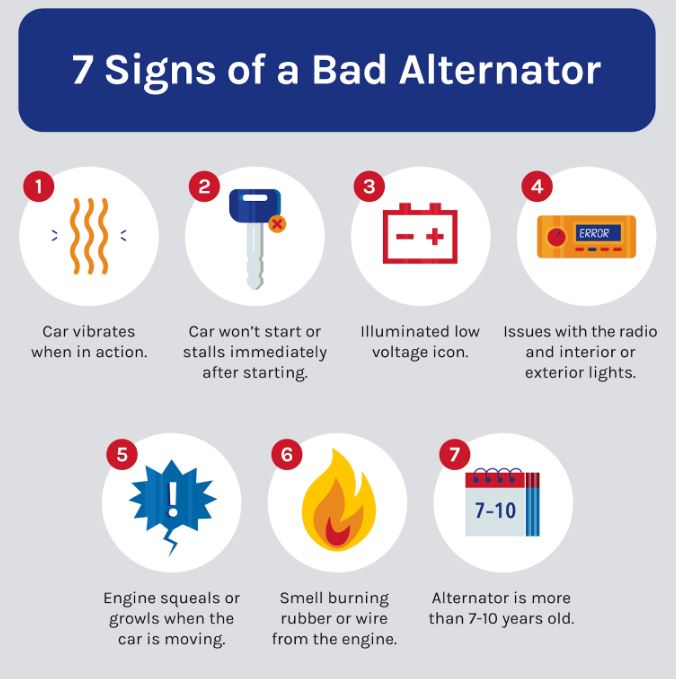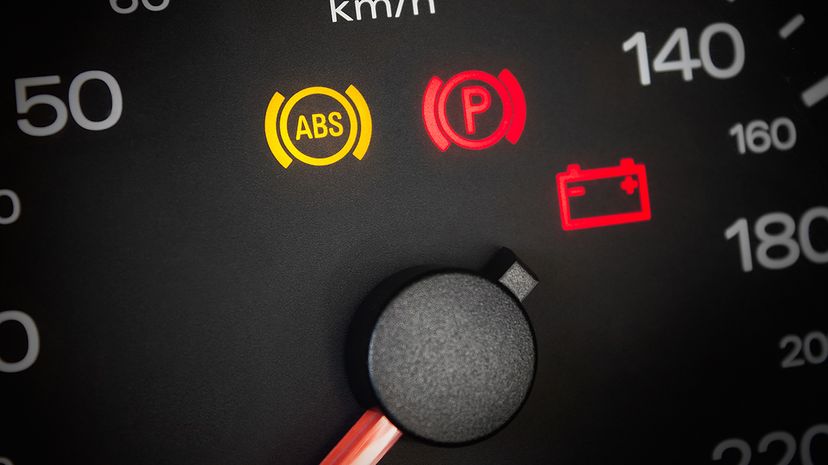5 Warning Signs of a Failing Car Alternator
The five warning signs of a failing car alternator are dim headlights, a dead battery, weird noises, electrical failures, and a dashboard warning light. A failing car alternator can be identified through these signs, which indicate it might be time to replace it.
We will explore each of these warning signs in detail and provide guidance on what to do if you suspect your car alternator is failing. Knowing these signs can help you prevent further damage to your vehicle and ensure a safe and problem-free driving experience.
So, let’s dive in and understand the tell-tale signs of a failing car alternator.
What Is A Car Alternator?
Understanding what a car alternator is can help you recognize when your vehicle is experiencing issues. An alternator is an essential component in a car’s electrical system that generates power to recharge the battery and supply electricity to various parts of the vehicle.
Function Of The Alternator
The alternator works by converting mechanical energy from the engine into electrical energy, which is used to power the car’s electrical systems and recharge the battery.
Importance Of The Alternator
An alternator plays a crucial role in ensuring that the battery stays charged and all electrical components of the car function correctly. Without a properly working alternator, the car may experience starting issues and electrical failures.
5 Warning Signs Of A Failing Car Alternator
- Dimming or flickering lights while driving.
- Strange noises such as whining or grinding.
- Battery warning light on the dashboard.
- Difficulty starting the car.
- Electrical issues like power windows or radio not working.

Credit: www.aaa.com
Warning Signs Of A Failing Alternator
Experiencing dim or flickering lights, strange smells, odd noises, difficulty starting the car, or a dead battery can all indicate a failing alternator in your car. If you notice any of these warning signs, it’s crucial to have your alternator checked as soon as possible to prevent a breakdown on the road.
Is your car acting up lately? It might be more than just your imagination. One of the critical components of your vehicle’s electrical system is the alternator. Responsible for keeping the battery charged and powering various electrical components, a failing alternator can spell trouble on the road.Dimming Or Flickering Lights
If you notice your headlights or interior lights dimming or flickering while driving, it could be a sign of a failing alternator. Dim lights indicate that the alternator is not generating enough power to keep the electrical system running smoothly. Don’t ignore this warning sign, as it may lead to more serious issues if left unaddressed.Strange Noises
Listen closely for any unusual noises coming from the engine compartment. A failing alternator can produce grinding, whining, or squealing sounds. These sounds typically indicate that the alternator’s internal components are wearing out or becoming faulty. Addressing this warning sign early can prevent further damage to your alternator and electrical system.Weak Or Dead Battery
If you find yourself constantly jump-starting your car or dealing with a weak battery, your alternator could be to blame. A failing alternator fails to recharge the battery while you drive, resulting in a weakened or dead battery. If your battery is relatively new and still experiencing issues, it’s time to have your alternator checked.Electrical Failures
Experiencing electrical failures, such as power windows or locks not working properly, can be a clear indication of a failing alternator. The alternator supplies power to these components, and if it’s not functioning correctly, you’re likely to encounter such issues. Addressing these electrical failures promptly can help prevent further damage to your vehicle’s electrical system.Dashboard Warning Light
Pay attention to the warning lights on your dashboard. If the alternator warning light, which looks like a battery or says “ALT” or “GEN,” illuminates while driving, it’s a glaring sign that your alternator needs immediate attention. Ignoring this warning could lead to a complete electrical system failure and leave you stranded on the side of the road. Now that you’re aware of the warning signs of a failing alternator, it’s crucial to have it inspected and repaired by a professional mechanic as soon as possible. Don’t overlook these indicators, as addressing the problem early can save you from expensive repairs and unexpected breakdowns.Impact Of Ignoring Alternator Issues
Discover the warning signs of a failing car alternator to prevent costly repairs. Ignoring issues may lead to battery failure, stalling, dim lights, strange noises, or dashboard warnings. Addressing these alerts promptly ensures a safer and smoother driving experience.
Battery Draining
Ignoring issues with your car’s alternator can have a severe impact on your vehicle’s battery. The alternator is responsible for charging the battery while the engine is running. If the alternator is failing, it won’t be able to keep the battery properly charged, resulting in a drained battery. This means that every time you start your car, you’ll be met with that dreaded clicking sound or worse, a completely dead battery. Not only is this incredibly inconvenient, but it can also leave you stranded in the middle of nowhere, waiting for a jump-start or a tow truck.Potential Electrical Damage
The alternator plays a crucial role in powering all the electrical components in your car. From the headlights and radio to the power windows and air conditioning, a failing alternator can lead to a host of electrical issues. When the alternator is struggling to generate enough power, you may notice dimming or flickering lights, or even intermittent loss of power in various systems. Left unaddressed, this can result in more significant electrical damage, such as burnt-out fuses or even damaged wiring.Costly Repairs
Ignoring alternator issues can ultimately lead to expensive repairs. As mentioned earlier, a failing alternator can cause damage to other electrical components in your car. If you continue to drive with a faulty alternator, you risk the need for extensive repairs. Additionally, a failing alternator can put extra strain on your car’s battery. Continuously running a weak battery can significantly shorten its lifespan, resulting in the need for a battery replacement sooner rather than later. Combining the cost of a new alternator with a new battery can quickly add up, especially if you’ve also incurred electrical damage.Stalled Engine
In some cases, a failing alternator can cause your engine to stall while driving. The alternator is responsible for supplying power to the ignition system and other vital components that keep your engine running smoothly. If the alternator can’t deliver enough power, the engine may suddenly shut off, leaving you in a dangerous situation, especially if you’re on a busy road or highway.Risk Of Sudden Breakdown
If you continue to ignore signs of a failing alternator, you’re running the risk of a sudden breakdown. The alternator is a critical component of your car’s electrical system, and when it fails completely, your car may become inoperable. Imagine being in the middle of an important meeting, a family outing, or running errands when suddenly your car breaks down, leaving you stranded and unable to go anywhere. This can be not only inconvenient but also potentially dangerous, depending on where you find yourself when the breakdown occurs. By addressing alternator issues at the first sign of trouble, you can avoid these risks and ensure that your car stays in optimal working condition. Don’t wait until it’s too late – take action and get your alternator checked by a professional if you suspect any problems.Steps To Diagnose Alternator Problems
Learn how to diagnose alternator problems with these five warning signs. From dimming lights to strange noises, these indicators can help you identify if your car’s alternator is failing.
Using A Multimeter
Utilize a multimeter to check the alternator's voltage output accurately.
- Connect the multimeter to the car battery and measure voltage output.
- Start the engine and observe the reading - should be around 13.8 to 14.8 volts.
- If the reading is below 12.2 volts, it indicates a potential alternator issue.
Visual Inspections
Conduct visual checks to look for signs of a failing alternator.
- Inspect the alternator belt for damage or excessive wear.
- Check for any unusual noises, burning smells, or flickering lights.
- Examine the alternator for visible signs of damage or corrosion.
Preventive Maintenance Tips
Regular Inspections
A regular inspection of the car alternator is crucial to ensure its smooth operation. Look for any signs of wear and tear, such as frayed wires or loose connections. It’s also important to check the belt tension and look for any abnormal noises coming from the alternator.
Keeping Connections Clean
It’s essential to keep the connections of the alternator clean in order to prevent any issues. Regularly clean the battery terminals and wiring connections to ensure a strong and reliable connection. This will help avoid any voltage drops or poor charging performance.

Credit: www.greatwater360autocare.com

Credit: auto.howstuffworks.com
Frequently Asked Questions Of 5 Warning Signs Of A Failing Car Alternator
What Are The First Signs Of Alternator Going Bad?
The first signs of a bad alternator include dimming headlights, a weak or dead battery, strange noises, and electrical issues with your vehicle.
How Does A Vehicle Act When The Alternator Is Going Out?
When an alternator is failing, the vehicle may show signs like dim lights, strange electrical issues, or difficulty starting.
How Do I Know When My Alternator Needs Replacing?
You’ll notice dimming lights, strange smells, or a dashboard warning light indicating charging problems. Unusual noises or difficulty starting the car are also signs. Get a professional inspection if you suspect alternator issues to prevent potential breakdowns.
What Warning Lights Come On When Alternator Is Bad?
When the alternator is bad, warning lights for battery, oil, or charging system may come on. It’s crucial to address these immediately to prevent damage.
Conclusion
Ensuring your car’s alternator is in top shape is crucial for smooth rides. Recognizing warning signs can prevent a breakdown. Addressing issues early can save you time and money. Stay proactive and schedule regular maintenance to extend the life of your alternator.
Drive with confidence, knowing your vehicle is reliable.
